List of United States Supreme Court cases, volume 188
| Supreme Court of the United States | |
|---|---|
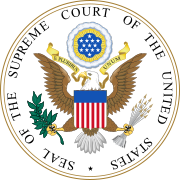 | |
| Established | March 4, 1789[1] |
| Location | Washington, D.C. |
| Coordinates | 38°53′26″N 77°00′16″W / 38.89056°N 77.00444°WCoordinates: 38°53′26″N 77°00′16″W / 38.89056°N 77.00444°W |
| Composition method | Presidential nomination with Senate confirmation |
| Authorized by | Constitution of the United States, Art. III, § 1 |
| Judge term length | life tenure, subject to impeachment and removal |
| Number of positions | 9 (by statute) |
| Website | supremecourt |
| This article is part of the series on the |
| Supreme Court of the United States |
|---|
 |
| The Court |
|
| Current membership |
|
| Lists of justices |
|
| Court functionaries |
|
|
| Constitutional law of the United States |
|---|
 |
| Overview |
|
| Principles |
|
| Government structure |
|
| Individual rights |
|
| Theory |
|
This is a list of the 54 cases reported in volume 188 of United States Reports, decided by the Supreme Court of the United States in 1903.
Justices of the Supreme Court at the time of volume 188 U.S.[]
The Supreme Court is established by Article III, Section 1 of the Constitution of the United States, which says: "The judicial Power of the United States, shall be vested in one supreme Court . . .". The size of the Court is not specified; the Constitution leaves it to Congress to set the number of justices. Under the Judiciary Act of 1789 Congress originally fixed the number of justices at six (one chief justice and five associate justices).[2] Since 1789 Congress has varied the size of the Court from six to seven, nine, ten, and back to nine justices (always including one chief justice).
When the cases in volume 188 were decided the Court comprised the following nine members:
| Portrait | Justice | Office | Home State | Succeeded | Date confirmed by the Senate (Vote) |
Tenure on Supreme Court |
|---|---|---|---|---|---|---|
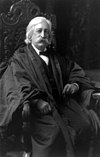
|
Melville Fuller | Chief Justice | Illinois | Morrison Waite | July 20, 1888 (41–20) |
October 8, 1888 – July 4, 1910 (Died) |
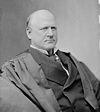
|
John Marshall Harlan | Associate Justice | Kentucky | David Davis | November 29, 1877 (Acclamation) |
December 10, 1877 – October 14, 1911 (Died) |
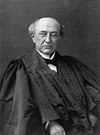
|
David Josiah Brewer | Associate Justice | Kansas | Stanley Matthews | December 18, 1889 (53–11) |
January 6, 1890 – March 28, 1910 (Died) |

|
Henry Billings Brown | Associate Justice | Michigan | Samuel Freeman Miller | December 29, 1890 (Acclamation) |
January 5, 1891 – May 28, 1906 (Retired) |
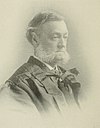
|
George Shiras Jr. | Associate Justice | Pennsylvania | Joseph P. Bradley | July 26, 1892 (Acclamation) |
October 10, 1892 – February 23, 1903 (Retired) |

|
Edward Douglass White | Associate Justice | Louisiana | Samuel Blatchford | February 19, 1894 (Acclamation) |
March 12, 1894 – December 18, 1910 (Continued as chief justice) |
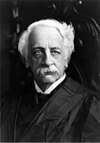
|
Rufus W. Peckham | Associate Justice | New York | Howell Edmunds Jackson | December 9, 1895 (Acclamation) |
January 6, 1896 – October 24, 1909 (Died) |
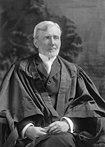
|
Joseph McKenna | Associate Justice | California | Stephen Johnson Field | January 21, 1898 (Acclamation) |
January 26, 1898 – January 5, 1925 (Retired) |

|
Oliver Wendell Holmes Jr. | Associate Justice | Massachusetts | Horace Gray | December 4, 1902 (Acclamation) |
December 8, 1902 – January 12, 1932 (Retired) |
Notable Case in 188 U.S.[]
Bleistein v. Donaldson Lithographing Co.[]
The Supreme Court in Bleistein v. Donaldson Lithographing Co., 188 U.S. 239 (1903), via an opinion written by Justice Oliver Wendell Holmes, Jr., held that advertisements were protected by copyright. The case is now cited for the proposition that commercial speech can be protected by copyright.
Citation style[]
Under the Judiciary Act of 1789 the federal court structure at the time comprised District Courts, which had general trial jurisdiction; Circuit Courts, which had mixed trial and appellate (from the US District Courts) jurisdiction; and the United States Supreme Court, which had appellate jurisdiction over the federal District and Circuit courts—and for certain issues over state courts. The Supreme Court also had limited original jurisdiction (i.e., in which cases could be filed directly with the Supreme Court without first having been heard by a lower federal or state court). There were one or more federal District Courts and/or Circuit Courts in each state, territory, or other geographical region.
The Judiciary Act of 1891 created the United States Courts of Appeals and reassigned the jurisdiction of most routine appeals from the district and circuit courts to these appellate courts. The Act created nine new courts that were originally known as the "United States Circuit Courts of Appeals." The new courts had jurisdiction over most appeals of lower court decisions. The Supreme Court could review either legal issues that a court of appeals certified or decisions of court of appeals by writ of certiorari.
Bluebook citation style is used for case names, citations, and jurisdictions.
- "# Cir." = United States Court of Appeals
- e.g., "3d Cir." = United States Court of Appeals for the Third Circuit
- "C.C.D." = United States Circuit Court for the District of . . .
- e.g.,"C.C.D.N.J." = United States Circuit Court for the District of New Jersey
- "D." = United States District Court for the District of . . .
- e.g.,"D. Mass." = United States District Court for the District of Massachusetts
- "E." = Eastern; "M." = Middle; "N." = Northern; "S." = Southern; "W." = Western
- e.g.,"C.C.S.D.N.Y." = United States Circuit Court for the Southern District of New York
- e.g.,"M.D. Ala." = United States District Court for the Middle District of Alabama
- "Ct. Cl." = United States Court of Claims
- "Ct. Com. Pl." = Court of Common Pleas (a state court)
- The abbreviation of a state's name alone indicates the highest appellate court in that state's judiciary at the time.
- e.g.,"Pa." = Supreme Court of Pennsylvania
- e.g.,"Me." = Supreme Judicial Court of Maine
List of cases in volume 188 U.S.[]
| Case Name | Page & year | Opinion of the Court | Concurring opinion(s) | Dissenting opinion(s) | Lower Court | Disposition of case |
|---|---|---|---|---|---|---|
| Kelley v. Rhoads | 1 (1903) | Brown | none | none | Wyo. | reversed |
| Weber v. Rogan | 10 (1903) | Brown | none | none | Tex. | dismissed |
| Andrews v. Andrews | 14 (1903) | White | none | none | Mass. | affirmed |
| Earle v. Carson | 42 (1903) | White | none | none | 3d Cir. | affirmed |
| Hale v. Allinson | 56 (1903) | Peckham | none | none | Cir. | affirmed |
| Diamond Match Co. v. Village of Ontonagon | 82 (1903) | McKenna | none | none | C.C.W.D. Mich. | affirmed |
| Billings v. Illinois | 97 (1903) | McKenna | none | none | Ill. | affirmed |
| American Colortype Co. v. Continental Colortype Co. | 104 (1903) | Holmes | none | none | C.C.N.D. Ill. | reversed |
| Nelson v. Northern P. Ry. Co. | 108 (1903) | Harlan | none | Brewer | Wash. | reversed |
| Smythe v. United States | 156 (1903) | Harlan | none | Peckham | 5th Cir. | affirmed |
| Beals v. Cone | 184 (1903) | Brewer | none | none | Colo. | dismissed for want of jurisdiction |
| Blackstone v. Miller | 189 (1903) | Holmes | none | none | N.Y. Surr. Ct. | affirmed |
| Connecticut Mut. Life Ins. Co. v. Hillmon | 208 (1903) | Brown | none | none | 8th Cir. | reversed |
| Easton v. Iowa | 220 (1903) | Shiras | none | none | Iowa | reversed |
| Bleistein v. Donaldson Lithographing Co. | 239 (1903) | Holmes | none | Harlan | 6th Cir. | reversed |
| The Manila Prize Cases | 254 (1903) | Fuller | none | none | Sup. Ct. D.C. | affirmed (part); reversed (part) |
| The Infanta Maria Teresa | 283 (1903) | Fuller | none | Brown | Sup. Ct. D.C. | reversed |
| Mutual Life Ins. Co. v. McGrew | 291 (1903) | Fuller | none | none | Cal. | dismissed for want of jurisdiction |
| Hooker v. City of Los Angeles | 314 (1903) | Fuller | none | none | Cal. | dismissed for want of jurisdiction |
| Lottery Case | 321 (1903) | Harlan | none | Fuller | C.C.N.D. Ill. | affirmed |
| Francis v. United States | 375 (1903) | Holmes | none | Harlan | 6th Cir. | reversed |
| Louisville & J.F. Co. v. Kentucky I | 385 (1903) | Harlan | none | none | Ky. | reversed |
| Louisville & J.F. Co. v. Kentucky II | 399 (1903) | Harlan | none | none | Ky. | reversed |
| Bigby v. United States | 400 (1903) | Harlan | none | none | C.C.E.D.N.Y. | affirmed |
| Cummings v. City of Chicago | 410 (1903) | Harlan | none | none | C.C.N.D. Ill. | affirmed |
| Calumet Grain Elevator Co. v. City of Chicago | 431 (1903) | Harlan | none | none | C.C.N.D. Ill. | affirmed |
| United States v. Rickert | 432 (1903) | Harlan | none | none | 8th Cir. | remanded to divided lower court |
| United States v. Lynah | 445 (1903) | Brewer | Brown | White | C.C.D.S.C. | affirmed |
| United States v. Williams | 485 (1903) | Brewer | none | none | C.C.D.S.C. | affirmed |
| Clarke v. Larremore | 486 (1903) | Brewer | none | none | 2d Cir. | affirmed |
| Williams v. Parker | 491 (1903) | Brewer | none | none | Mass. | affirmed |
| Reetz v. Michigan | 505 (1903) | Brewer | none | none | Mich. | affirmed |
| Leach v. Burr | 510 (1903) | Brewer | none | none | D.C. Cir. | affirmed |
| Schaefer v. Werling | 516 (1903) | Brewer | none | none | Ind. | affirmed |
| Tarrance v. Florida | 519 (1903) | Brewer | none | none | Fla. | affirmed |
| Northern P. Ry. Co. v. Soderberg | 526 (1903) | Brown | none | none | 9th Cir. | affirmed |
| Prout v. Starr | 537 (1903) | Shiras | none | none | C.C.D. Neb. | affirmed |
| Gutierres v. Albuquerque Land & Irr. Co. | 545 (1903) | White | none | none | Sup. Ct. Terr. N.M. | affirmed |
| Rankin v. Chase Nat'l Bank | 557 (1903) | White | none | none | 2d Cir. | reversed |
| Commercial Pub. Co. v. Beckwith | 567 (1903) | White | none | none | Sup. Ct. N.Y. | affirmed |
| United States v. Barringer | 577 (1903) | White | none | none | Ct. Cl. | reversed |
| Waggoner v. Flack | 595 (1903) | Peckham | none | none | Tex. Ct. App. | affirmed |
| Helwig v. United States | 605 (1903) | Peckham | none | none | 2d Cir. | remanded to divided lower court |
| Jaquith v. Rowley | 620 (1903) | Peckham | none | none | D. Mass. | affirmed |
| American Ice Co. v. Eastern Tr. & Banking Co. | 626 (1903) | Peckham | none | none | D.C. Cir. | affirmed |
| Boston & M.C.C. & S.M. Co. v. Montana O.P. Co. | 632 (1903) | Peckham | none | none | C.C.D. Mont. | affirmed |
| Winslow v. Baltimore & O.R.R. Co. | 646 (1903) | Peckham | none | none | D.C. Cir. | reversed |
| Chicago Theological Seminary v. Illinois | 662 (1903) | Peckham | none | White | Ill. | affirmed |
| Indiana Mfg. Co. v. Koehne | 681 (1903) | Peckham | none | none | C.C.D. Ind. | affirmed |
| Hyatt v. People ex rel. Corkran | 691 (1903) | Peckham | none | none | N.Y. | affirmed |
| The Mangrove Prize Money | 720 (1903) | Holmes | none | none | S.D. Fla. | affirmed |
| Home Life Ins. Co. v. Fisher | 726 (1903) | Holmes | none | none | C.C.N.D. Fla. | affirmed |
| Kidd v. Alabama | 730 (1903) | Holmes | none | none | Ala. | affirmed |
| Fourth Nat'l Bank v. Albaugh | 734 (1903) | Holmes | none | none | 8th Cir. | affirmed |
Notes and references[]
- ^ Lawson, Gary; Seidman, Guy (2001). "When Did the Constitution Become Law?". Notre Dame Law Review. 77: 1–37.
- ^ "Supreme Court Research Guide". Georgetown Law Library. Retrieved April 7, 2021.
See also[]
- Certificate of division
External links[]
- [1] Case reports in volume 188 from Library of Congress
- [2] Case reports in volume 188 from Court Listener
- [3] Case reports in volume 188 from the Caselaw Access Project of Harvard Law School
- [4] Case reports in volume 188 from Google Scholar
- [5] Case reports in volume 188 from Justia
- [6] Case reports in volume 188 from Open Jurist
- Website of the United States Supreme Court
- United States Courts website about the Supreme Court
- National Archives, Records of the Supreme Court of the United States
- American Bar Association, How Does the Supreme Court Work?
- The Supreme Court Historical Society
- Lists of United States Supreme Court cases by volume
- 1903 in United States case law
